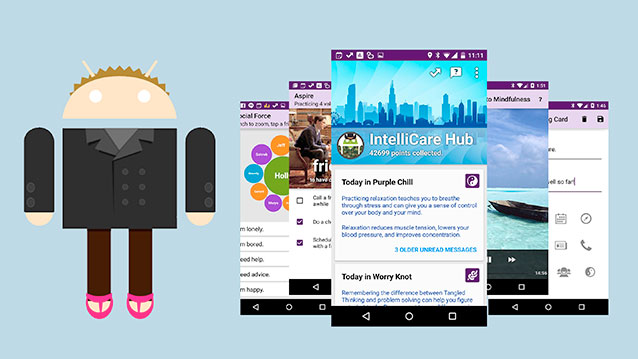CHICAGO --- Feeling blue or anxious? Now, there’s a mobile ‘therapist’ designed to understand you and suggest the ideal mini-app to lift your particular mood.
The ‘therapist’ is Intellicare, a new suite of 12 interactive mini-apps to combat depression and anxiety, launched by Northwestern Medicine and funded by the National Institute of Mental Health.
Do you criticize yourself a lot? “Thought Challenger” can help. Ruminating about the tense meeting with your boss? Use the “Worry Knot” app. Does your life sometimes feel empty or meaningless? Try “Aspire.”
Intellicare will function like a shopping site that recommends the perfect pair of platform sandals based on your past purchases and browsing. But this app will suggest a simple mobile app to salve your mental distress based on your past preferences and feedback from the larger crowd of users.
The new mini apps are currently free for download on Google Play for Android phones. You can find the ones that are right for you. Or you can use the IntelliCare Hub app, which will make recommendations for you. The recommender system -- novel for mental health apps -- will be built based on information it receives from users about what is useful, and will become more accurate as the user base grows.
“This is precision medicine for treating depression and anxiety delivered directly to the user,” said David Mohr, professor of preventive medicine at Northwestern University Feinberg School of Medicine and director of the Center for Behavioral Intervention Technologies. “Using digital tools for mental health is an important part of our future. It will help the millions of people who want support but can’t get to a therapist’s office.”
The Intellicare algorithm will recommend new apps each week to keep things fresh, provide new opportunities for learning skills and avoid user boredom. Each one was designed by Northwestern clinicians and based on validated techniques used by therapists.
“We know these approaches work,” Mohr said. “They are designed to teach many of the same skills that therapists try to teach people. Different things work for different people. The goal is to find what’s right for you.”
Mobile mental health is a growing field that’s generating excitement. But most of the apps available today are poorly designed and not based on validated psychological theory, Mohr said. People may download them but often don’t use them more than once. Thus, it’s important to create apps that can continue to offer new strategies, so people stay engaged.
Mental health treatment delivered on mobile phones or the web has the potential to help the millions of Americans who do not get adequate care for depression and anxiety because of time constraints, cost or reluctance to talk to a therapist. More than 20 percent of Americans will have significant symptoms of depression or anxiety each year, but only around 20 percent of people with a mental health problem get adequate treatment.
Intellicare is a national research study. Individuals can download the apps with no obligation. But Northwestern researchers hope users will provide confidential feedback, via four weekly questions, that will be used to develop the recommender system. The data will help the system make better recommendations and provide more personalized treatment.
People also may enroll in a study in which they will be paid to provide more feedback. They also will have access to an Intellicare coach who will support them in using the apps. This study will assess Intellicare’s effectiveness for treating depression and anxiety.
Learn more at https://intellicare.cbits.northwestern.edu/
Join the study at https://intellicare.cbits.northwestern.edu/join


